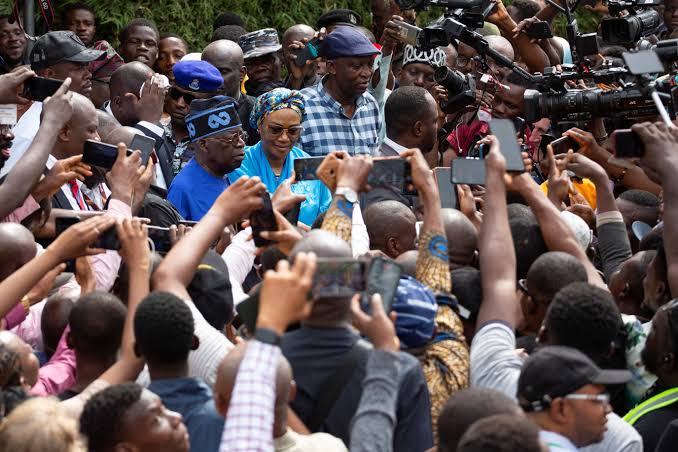
Government exists for the people. The people are the central shaft from where government’s authority revolve. They are the oxygen, the mitochondrion of government. They exist for the government to exist.
The Nigerian Constitution puts it this way: ‘’Sovereignty belongs to the people of Nigeria from whom government through this Constitution derives all its powers and authority.’’
The Tinubu administration has made it sufficiently patent that Nigerians are the nucleus of its governance cell. It keeps rolling out programmes specifically addressing the needs of the vulnerable and the most vulnerable population in the country.
The administration recently launched the Presidential Conditional Grant Programme and the Presidential Palliative Loan Programme. These seminal programmes customised for small businesses are managed by the Federal Ministry of Industry, Trade, and Investment.
Micro businesses will receive N50,000 grant, while MSMEs and manufacturers will access loans up to N1 million and N1 billion respectively.
The administration has also launched a good number of mitigatory vehicles such as the Renewed Hope Grants for Poor and Vulnerable Persons, the ‘’Iyaloja Initiative’’ under the expanded Government Enterprise, and Empowerment Programme (GEEP) – with over 1.5 million Nigerian retail businesses receiving N50,000 interest-free loans, and several others.
These programmes are in full apprehension of the encumbrances to small businesses as well as in cognisance of the entrepreneurial proclivities of the Nigerian. Give the Nigerian retailer a little support, and he will return like the man with the five talents, doubling his fortune.
In the 2024 Appropriation Bill, N534 billion was earmarked for social development and poverty reduction. This further accents the importance ascribed to the needs of hard working Nigerians.
Reducing poverty demands a targeted and sustained approach on impact investments. It is not ‘’touch and go’’. Impact investments have corollarial effects on the local economy, raising income levels, and boosting productivity. Tanzania’s Productive Social Safety Nets, for instance.
It is all about the people for the Tinubu administration. It is about the vulnerable, the most vulnerable, and Nigerians across all strata.
A common thread in the tapestry of President Tinubu’s public remarks is the focalisation of the people, the show of concern and empathy, and the dispatch of remedial anodynes.
Leadership needs a handsome dose of empathy. Leadership needs to be able to connect with the people, harken to them, pull them close in times of peril, comfort them, protect them, heal them when broken, and lead them, not condescendingly.
An essential ingredient of leadership is “accessibility”. According to Hans Finzel in his book, ‘Top Ten Ways to be a Great Leader’, you do not get into office and suddenly build walls.
The Tinubu administration is a fine specimen of open and transparent leadership. The administration has been bringing the people closer to its bosom, opening its corporeal portals. It has been responsive and attuned to the citizenry. It is government citizens led.
In the past week, there were concerns over the number of Nigeria’s delegation to COP28 in Dubai, United Arab Emirates (UAE). Without seeking to engage sordidly the propaganda of those, who sought to extract political toll from misinformation, the government’s information apparatus provided a clear, concise, and honest reality of the fact.
This was in line with the strong values and principles of transparency and accountability that form the core piers of the Tinubu administration. The voices of Nigerians are heard and respected.
The 1,411 federal government delegation fib was obviously a poor contrivance of falsehood. The number was far lower than the manufactured and obfuscated apparition.
As the ministry of information said, as the biggest economy and most populous country in Africa, with a substantial extractive economy and extensive vulnerability to climate change, Nigeria has a significant stake in climate action, and our active and robust participation at COP28 was therefore not unwarranted. COP-28 presents an array of investment and partnership opportunities for the various sectors affected by climate change.
The concerns appear to have drowned out the big wins from the event for Nigeria like the signing of an accelerated performance agreement to expedite the implementation of the Presidential Power Initiative (PPI) to improve Nigeria’s electricity supply, as well as the unveiling of the Nigeria Carbon Market Activation Plan, co-chaired by the Executive Chairman of the Federal Inland Revenue Service (FIRS), Mr. Zacch Adedeji, and the Director-General of the National Council on Climate Change (NCCC), Dr. Dahiru Salisu, among others.
It is important to emphasise that the place of Nigerians as the centrepiece of governance remains undisputed. Nigerians are the priority of the administration.
Fredrick Nwabufo is Senior Special Assistant to the President on Public Engagement
